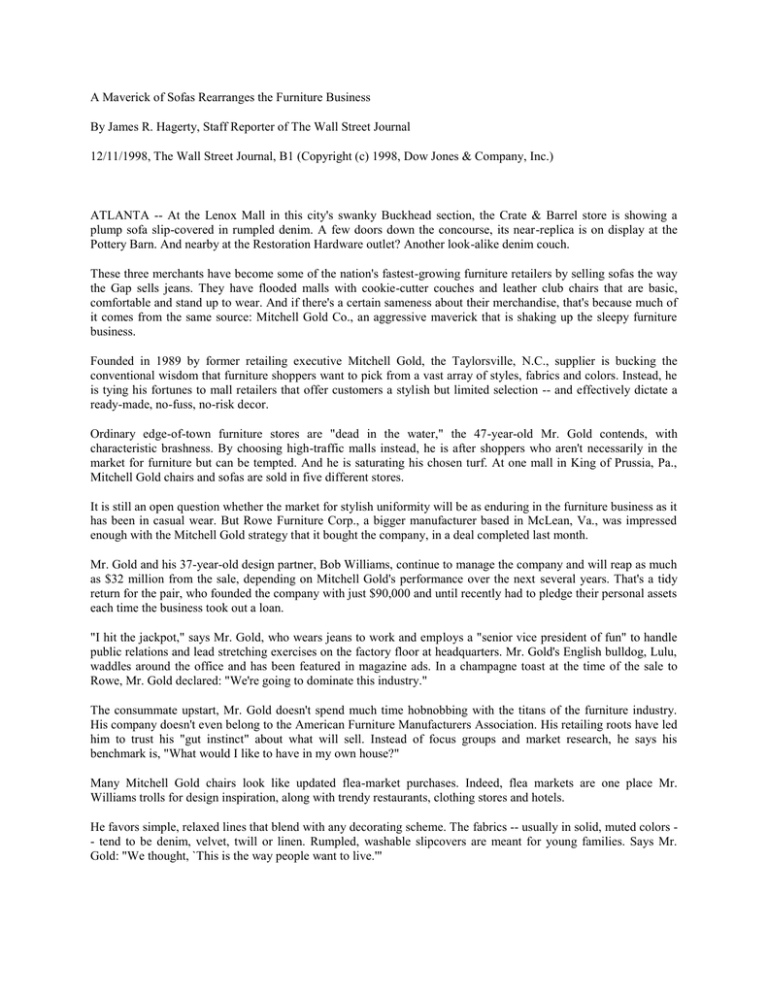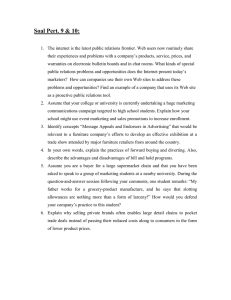
A Maverick of Sofas Rearranges the Furniture Business
By James R. Hagerty, Staff Reporter of The Wall Street Journal
12/11/1998, The Wall Street Journal, B1 (Copyright (c) 1998, Dow Jones & Company, Inc.)
ATLANTA -- At the Lenox Mall in this city's swanky Buckhead section, the Crate & Barrel store is showing a
plump sofa slip-covered in rumpled denim. A few doors down the concourse, its near-replica is on display at the
Pottery Barn. And nearby at the Restoration Hardware outlet? Another look-alike denim couch.
These three merchants have become some of the nation's fastest-growing furniture retailers by selling sofas the way
the Gap sells jeans. They have flooded malls with cookie-cutter couches and leather club chairs that are basic,
comfortable and stand up to wear. And if there's a certain sameness about their merchandise, that's because much of
it comes from the same source: Mitchell Gold Co., an aggressive maverick that is shaking up the sleepy furniture
business.
Founded in 1989 by former retailing executive Mitchell Gold, the Taylorsville, N.C., supplier is bucking the
conventional wisdom that furniture shoppers want to pick from a vast array of styles, fabrics and colors. Instead, he
is tying his fortunes to mall retailers that offer customers a stylish but limited selection -- and effectively dictate a
ready-made, no-fuss, no-risk decor.
Ordinary edge-of-town furniture stores are "dead in the water," the 47-year-old Mr. Gold contends, with
characteristic brashness. By choosing high-traffic malls instead, he is after shoppers who aren't necessarily in the
market for furniture but can be tempted. And he is saturating his chosen turf. At one mall in King of Prussia, Pa.,
Mitchell Gold chairs and sofas are sold in five different stores.
It is still an open question whether the market for stylish uniformity will be as enduring in the furniture business as it
has been in casual wear. But Rowe Furniture Corp., a bigger manufacturer based in McLean, Va., was impressed
enough with the Mitchell Gold strategy that it bought the company, in a deal completed last month.
Mr. Gold and his 37-year-old design partner, Bob Williams, continue to manage the company and will reap as much
as $32 million from the sale, depending on Mitchell Gold's performance over the next several years. That's a tidy
return for the pair, who founded the company with just $90,000 and until recently had to pledge their personal assets
each time the business took out a loan.
"I hit the jackpot," says Mr. Gold, who wears jeans to work and employs a "senior vice president of fun" to handle
public relations and lead stretching exercises on the factory floor at headquarters. Mr. Gold's English bulldog, Lulu,
waddles around the office and has been featured in magazine ads. In a champagne toast at the time of the sale to
Rowe, Mr. Gold declared: "We're going to dominate this industry."
The consummate upstart, Mr. Gold doesn't spend much time hobnobbing with the titans of the furniture industry.
His company doesn't even belong to the American Furniture Manufacturers Association. His retailing roots have led
him to trust his "gut instinct" about what will sell. Instead of focus groups and market research, he says his
benchmark is, "What would I like to have in my own house?"
Many Mitchell Gold chairs look like updated flea-market purchases. Indeed, flea markets are one place Mr.
Williams trolls for design inspiration, along with trendy restaurants, clothing stores and hotels.
He favors simple, relaxed lines that blend with any decorating scheme. The fabrics -- usually in solid, muted colors - tend to be denim, velvet, twill or linen. Rumpled, washable slipcovers are meant for young families. Says Mr.
Gold: "We thought, `This is the way people want to live.'"
After growing up in Trenton, N.J., where he worked in his father's grocery store, Mr. Gold earned a history degree at
Long Island University. During the 1970s he worked for Bloomingdale's in New York, eventually becoming a
furniture buyer for the chain, part of Federated Department Stores Inc. Later, he worked as an executive at the Lane
division of Furniture Brands International Inc.
Lane fired him, Mr. Gold says, because he accused one of his bosses of misleading customers about delivery times.
A spokesman for Furniture Brands says he was simply let go as part of a staff reduction. In any case, Mr. Gold's
severance package helped finance the launch of his company.
He wanted to test his long-held notion that malls were an untapped venue for furniture merchants. And he was
convinced that by shunning lavish showrooms and catalogs, he could turn out stylish pieces at prices below much of
the competition. Mitchell Gold sofas retail for around $1,000 to $1,500. Its $1,300 leather club chairs have been
particularly successful.
Mr. Gold had met Mr. Williams in New York while working at Lane, and the two friends joined forces as 50-50
partners. Mr. Gold put his soft-spoken partner in charge of design, even though Mr. Williams knew virtually nothing
about creating upholstered furniture. A graduate of a New York design school, he had previously worked for an ad
agency and in the promotions department at Seventeen magazine.
"I think it was sort of an advantage not knowing anything," Mr. Williams says, "because you didn't have any
preconceived ideas." He makes rough sketches, and his production team at the factory works out the details.
Though the Mitchell Gold brand isn't a household word, Mr. Gold has scrambled to build recognition. Taking a cue
from Calvin Klein, he ran sexy ads for his brand in the early 1990s in national publications. In one ad, rejected by
some magazines as too racy, a nude male model lounges on a sofa with a strategically placed pillow. In another,
Lulu the bulldog sprawls across the lap of an apparently naked young man. (The Mitchell Gold label appears on the
furniture, but discreetly. Shoppers at Pottery Barn, for example, have to peek beneath the cushions to see the brand
name.)
For Rowe Furniture's chairman, Gerald M. Birnbach, the main attraction was the mall shops. Rowe sells mainly
through traditional furniture stores, some of them struggling to survive. But Mr. Birnbach sees merchants like Crate
& Barrel, Restoration Hardware Inc. and the Pottery Barn unit of Williams-Sonoma Inc. as especially savvy at
discerning what customers want. They stress style, while conventional furniture stores are "still harping" about
slashed prices and easy credit, he says.
About half of Mitchell Gold's inventory goes to these three chains. Though they account for less than 1% of retail
furniture sales in the U.S., they are growing much faster than most rivals. "Our goal is to be the dominant homefurnishings brand in America and eventually the world," says Gary Friedman, the retailing chief at WilliamsSonoma. He hopes its Pottery Barn division can be to furniture what Gap Inc. is to casual clothing.
Gap may covet that role for itself, however. Some of its Banana Republic stores now carry sheets and towels and
hope to add furniture in 1999, a spokeswoman says. Mitchell Gold is among the potential suppliers that have
discussed the project.
Despite the ambitious game plans, it isn't yet clear whether the Gap concept will fly with furniture. While most
Americans don't seem to mind wearing the same T-shirt as their neighbor, they may blanch at choosing the same
sofa for their living rooms. Rival furniture makers and retailers believe that most consumers will continue to trek to
traditional stores offering more choice. Mitchell Gold furniture appeals to many affluent baby boomers but isn't for
everyone, says Jerry Epperson, an investment banker who specializes in the industry.
After inspecting the furniture at Pottery Barn and Crate & Barrel at the Lenox Mall in Atlanta on a recent Saturday,
Susanne Memolo, a homemaker from Gastonia, N.C., warns: "If you buy something here, you're going to see it at
half your friends' houses."
Mr. Gold acknowledges the risk that too much sameness could turn shoppers off. The trick, he says, will be to keep
changing the look every six months or so. Mr. Williams promises sleeker, less rumpled designs for the spring, with
fewer casual khaki tones and more soft grays. Consumers, he says, want more sophisticated, urban style. "They want
to get dressed up a bit," he says.
Copyright © 2000 Dow Jones & Company, Inc. All Rights Reserved.
TIME Bonus Section/Inside Business/Retail
Gold's New Rush ; He's the man behind the furniture we live with. Now Mitchell Gold wants to set a new standard
all his own
Lev Grossman
03/11/2002 Time Magazine Time Inc. Y17 [Not Available In All Editions] (Copyright 2002)
Not so very long ago, we liked everything to be smooth and sleek and glossy. We liked glass coffee tables in our
living rooms and black lacquered tiles in our bathrooms. Then suddenly everything changed. Fabrics became worn
and soft. Leather became old and brown and distressed. Smooth was out, texture was in. What happened? It all
started with two gay men and an English bulldog in a tiny town in North Carolina.
They don't have the brand power of Martha Stewart, but Mitchell Gold, Bob Williams and their dog Lulu are
changing the way you decorate your living room. Gold and Williams are the Mitchell Gold Co. of Taylorsville,
N.C., which they founded together in 1989 and which has grown into a business that sold close to $70 million worth
of furniture last year. That may sound paltry next to the hundreds of millions pulled in by such A-list retailers as
Pottery Barn, Crate & Barrel and Restoration Hardware (armchair giant La-Z-Boy did $2.6 billion in sales last year).
But guess who makes most of their upholstered furniture? And the leather club chairs and slipcover sofas in Ally
McBeal and Friends? Mitchell Gold.
After 20 years of nonstop growth, the furniture industry is on a downhill slide. According to the American Furniture
Manufacturers Association, shipments dropped 10% last year, to $23 billion. Chains such as Montgomery Ward,
Heilig-Meyers and Sears Homelife went bust, flooding the market with discounted furniture. "It was as bad an
industry downturn as we've experienced in our careers," says Joel Havard, vice president of equity research at
BB&T Capital Markets. Amid that wreckage, Mitchell Gold is opening its very first store, a self-contained shop at
ABC Carpet & Home, the upscale New York City clearinghouse for fine housewares of every kind.
The secret of the company's success goes back to Gold's childhood in a house full of fussy, formal furniture.
"Growing up, we had cane- backed dining-room chairs that really weren't comfortable," says Gold. "We couldn't
have a dog. We weren't even allowed to sit in the living room." That helped him appreciate the pleasures of an
overstuffed sofa. He met Williams in 1986 in New York City, where Gold spent six years as a furniture buyer for
Bloomingdale's and Williams worked as a graphic designer for Seventeen magazine. They both saw the same
opportunity: a stuffy furniture industry just waiting to be turned upside down.
Gold and Williams found inspiration where most people find their pleated relaxed-fit chinos: J. Crew. "We looked at
J. Crew's blue shirt that comes already broken in," says Gold. "It's your favorite shirt from your closet. It's familiar."
Their idea was to synthesize that familiarity using new materials that felt and looked like well- worn heirlooms.
Gold calls his furniture philosophy "relaxed design," which means elegant and affordable, old and new, all at the
same time. It makes deracinated college students feel as if they're at home, urban hipsters feel as if they're in the
country and suburban yuppies in ranch houses feel like aristocrats, all for a reasonable price. Restoration Hardware
founder Stephen Gordon, no stranger to selling nostalgia, compares Gold with Ralph Lauren: "He doesn't really
offer a 1930s suit, because nobody would wear it, but he offers the associations of a 1930s suit."
The formula paid off immediately. In the company's first year, Gold says, it turned a profit on $1.5 million in sales,
and the ink has been black ever since. Gold and Williams celebrated by acquiring an En-glish bulldog they named
Lulu, who has become the company's advertising mascot. In 1998 Gold sold out to the Rowe Cos., owners of Rowe
Furniture, which makes upholstered and leather furniture, and two retail chains, Home Elements and Storehouse.
The deal afforded Gold financial security, and the ongoing relationship is strictly hands off.
The real wonder of the Mitchell Gold Co. is that its reach has consistently exceeded its limits. For all the ubiquity of
those brown leather club chairs, they were an initial disaster. Gold and Williams picked up a pair of 1930s vintage
chairs at a flea market outside Paris in 1994. But they were too small for 1990s American legs. When they
approached leather wholesalers with their order, Gold and Williams found that American companies were not
prepared for them: they could buy white leather or teal leather, but not basic brown. What's more, the key to the
chairs was their age, their power to evoke the cigar-laden atmosphere of a bygone era, so the leather had to look old.
After a long search, Gold found a factory in the Netherlands with a process for distressing leather to make it look
artificially aged. He bought up its entire year's output, $100,000 worth, and turned the exclusive rights over to
Pottery Barn.
Gold's alliance with Pottery Barn was just the first in a string of special relationships with retailers that has given
him unmatched access to middle-class American households and has impressed industry watchers. "It's quite
unusual to have captured them to the extent that he has," says Donna Warner, veteran editor of urban-style bible
Metropolitan Home. These relationships come partly from connections Gold made during his stint as a buyer: when
Pottery Barn decided to start carrying furniture, a friend there made sure its buyers knew about Gold and vice versa.
He has also consistently backed the right horses, judging from the start which stores could take him where he
wanted to go. "We smelled early on that these were going to be the hot retailers of the next decade," says Gold.
One secret of Gold's success has been an exceptional knack for supply-chain management. Every shipment passes
under the watchful eye of a full-time statistician, a "master planner" who constantly surveys retailers and
wholesalers, anticipating their demands so the factory can be ready with the necessary personnel and raw materials.
In 2001 mad-cow disease had most manufacturers scrambling to fill orders for leather furniture, but not Gold: when
the epidemic first made headlines, he bought up $5 million worth of South American hides, enough to keep the club
chairs rolling for the next eight months. Result: 97% of the company's orders arrive on time. Gold limits his business
to a selection of high-volume accounts on which he can lavish personal attention. About five years ago, he
deliberately reduced his slate of buyers from 72 to 48; in the subsequent year, his business increased almost 50%,
and since then his work force has more than doubled. "Joe Schmoe's company can knock off our style," he boasts,
"but they can't reproduce our service."
The ultimate key to the firm's success may be the mutual respect between Gold and the rural community that has
become his entrepreneurial base. Tiny Taylorsville, 1 1/2 hours north of Charlotte, has more than 60 churches, most
of them Baptist, but from the beginning Gold and Williams defied local convention by being openly gay. "When I
came out," Gold says, "I decided I just didn't care anymore. When we moved down South, we just bought a house
and moved right in, didn't even think about it."
They did think about their role as employers. Along with a gourmet chef and a free gym, Gold gave his workers
Lulu's Child Enrichment Center, a $500,000 day-care facility that is run on a strictly break- even basis. "When you
drive up to the factory, the first things you see are toys and kids running around," Gold says with pride. "You know
something special is going on." The message is getting through: Gold says a local minister sent him a letter
congratulating him on his commitment to family values. These values are paying off: employee turnover is less than
2%, which means exceptional productivity. BDO Seidman rates productivity at Gold's factory at $168,000 per
employee, compared with an industry average of $105,000.
Until now Gold has been content to direct American taste from behind the scenes. But this month, when the first
Mitchell Gold retail outlet opens at ABC Carpet & Home, Gold will be selling straight to consumers, with no safety
net and nobody else's name on the label. "We're going to really push the boundaries of his work," says Evan Cole,
president of ABC. "He's going to do some avant-garde stuff. He'll really be able to use his creativity." Also for the
first time, he will be risking channel conflict with his closest allies, the retailers that made his fortune (that's one
reason Gold has steered clear of the Web).
As for that downturn in the furniture industry? In addition to the carnage among the retail outlets, Rowe, Mitchell
Gold's parent company, plans to consolidate its two retail chains later this year. How does it all affect Gold? "It
doesn't," he says curtly. "The people we sell to have not contracted. The people we sell to are the exciting, profitable
retailers who are expanding!"
Gold even sees an upside from last year's terror attacks in the U.S., at least from the retail perspective. "Post-Sept.
11, people have really had this much deeper, warmer feeling for family and friends," he muses. "That translates in
subtle ways into how people furnish their homes: people will stay home more." Another positive bellwether:
furniture sales have not kept up with construction of private homes, which suggests pent-up demand waiting to be
released. Williams and Gold are tight-lipped about how the company will respond to the new national mood in its
furniture, but think guest-friendly items like sectional sofas.
Throughout all this, Gold's only false move may have been not taking out his brand earlier. Plagiarism is epidemic
in the furniture industry, and there are few designers who haven't borrowed, if not stolen, from his work. But, as is
not the case with Chanel perfume or Rolex watches, few people care whether their slipcovered sofa is an authentic
Mitchell Gold or a knockoff, and that could hurt him. Nonetheless, there's no arguing with his influence: he is
everywhere. Walk into any hipster apartment from New York City to Nashville, Tenn., and you will see his work, or
at least his influence. "I do think about not letting stuff get too pedestrian," Gold says. "I was in London a few
months ago, and I saw all this furniture being unloaded into a flat, and I said, 'That's my Kathleen sofa! That's my
Pottery Barn chair! This is really too much!'" Never one to miss an opportunity, Gold walked right in and introduced
himself to the owner. "The first thing she asked me was 'Where's Lulu?'"
Copyright © 2000 Dow Jones & Company, Inc. All Rights Reserved.




